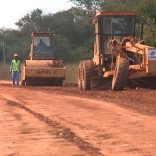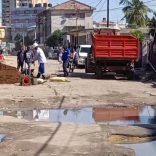Mozambique: Government to set up AI monitoring commission
Mozambique seeks revenue sources to rehabilitate roads as tolls cover only 10% of needs

Photo: Ministério dos Transportes e Logistica
The Mozambican Minister of Transport and Logistics admitted on Saturday that new sources of revenue are needed to build and maintain roads, as the collection of fees at 40 national tolls provides less than 10% of the needs.
“Right now, the challenge is to try to re-engineer finances and find other sources of revenue to guarantee road construction and maintenance,” João Matlombe told reporters on the sidelines of a visit to new road construction sites in the southern province of Inhambane.
“Currently, tolls don’t cover even 10% of our Road Fund needs, especially because they can’t be applied to all roads,” the minister noted, explaining that there are currently nearly 40 tolls on national roads, operated by various companies, such as the South African private company TRAC, Revimo and a subsidiary of the Road Fund.
“It won’t be solely with tolls or the fuel tax revenue that we’ll maintain the roads,” Matlombe acknowledged.
The Road Fund, which is responsible for managing Mozambican roads, also employs this model, but some tolls have already had to be abandoned due to their infeasibility, such as this year in Gaza province, in the south of the country. However, the road “must be maintained” by the state.
“In each entity, revenue is managed differently, because Revimo is a company that made an investment and has to recover it, so the revenue doesn’t go directly to the state. TRAC also made an investment; it collects the revenue, but it doesn’t go to the state. The State Fund is the only entity that is 100% state-owned and collects the revenue that goes to the state. But the revenue is variable and isn’t directly applied to that road alone,” Matlombe explained.
The Mozambican government announced on May 29 that it had already secured US$1.1 billion (€970 million) to rehabilitate National Highway 1 (N1), the country’s main thoroughfare, approximately one-third of the required funding.
“We have already mobilized a total of approximately US$3.5 billion (€3.08 billion) to ensure its reconstruction, with approximately US$1.1 billion (€969 million) secured,” João Matlombe told parliament at the time.
Responding to questions from members of parliament, the minister acknowledged that the Mozambican government faces challenges in mobilizing the remaining resources, while promising continued efforts to ensure the road’s complete rehabilitation.
The Mozambican government also intends to move forward with the project to rehabilitate an additional 340 km of the N1, including 70 km of the Inchope-Gorongosa section in Sofala province, 176 km of the Chimuara-Nicoadala section in Zambézia, and 94 km of the Metoro-Pemba section in Cabo Delgado.
These sections will be rehabilitated within the World Bank’s $850 million (€797 million) financing package, with almost half of the amount allocated to the first phase.
The government also announced that a tender has already been launched to select a contractor for the rehabilitation of 84 km of the Gorongosa-Caia section in the centre of the country.
The Mozambican government in fact acknowledges the need to rehabilitate the entire N1, given its advanced state of degradation.
“There is a need to ensure the rehabilitation and maintenance of approximately 2,620 km of the north-south link, as well as the main regional logistics corridors,” Minister Matlombe said.












Leave a Reply
Be the First to Comment!
You must be logged in to post a comment.
You must be logged in to post a comment.